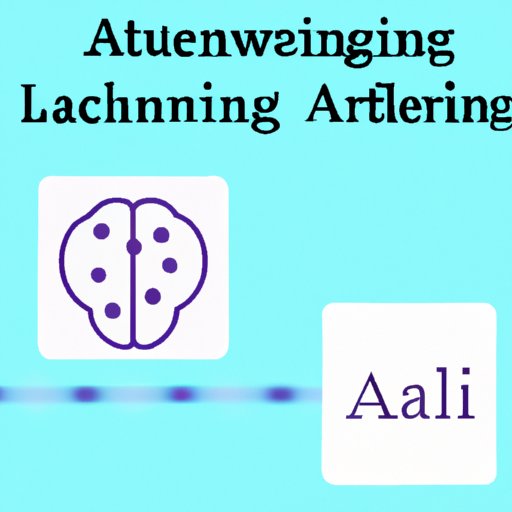Introduction
Artificial intelligence (AI) has been a rapidly growing field in recent years, and with this growth comes an increased interest in understanding how AI learns. In particular, many are interested in exploring how AI can learn by itself, without relying on human guidance. This form of autonomous AI learning holds great potential for improving the capabilities of AI and its applications in various fields.
In order to understand how AI learns by itself, it is important to first look at the basics of AI learning algorithms. We will examine the different types of supervised and unsupervised learning algorithms used in AI, and explore how neural networks can be used to enable self-learning AI. We will then delve into the concept of reinforcement learning and its role in autonomous AI, before analyzing the potential benefits and challenges of self-learning AI. Finally, we will evaluate the potential impact of autonomous AI learning on society.

Examining the Basics of AI Learning Algorithms
AI learning algorithms are used to give computers the ability to “learn” from data. These algorithms can be divided into two main categories: supervised learning and unsupervised learning. Supervised learning algorithms involve providing the computer with labeled data, such as images with labels that indicate what they are. The computer is then trained on this data to recognize patterns and make predictions. Unsupervised learning algorithms, on the other hand, do not use labeled data. Instead, the computer is given unlabeled data and must identify patterns and structure in the data on its own.
Within these two categories, there are several different types of algorithms commonly used in AI learning. For supervised learning, some of the most common algorithms include decision trees, support vector machines, and random forests. For unsupervised learning, some of the most common algorithms include clustering, principal component analysis, and deep learning.
Exploring the Role of Neural Networks in Self-Learning AI
Neural networks are a type of artificial intelligence algorithm that is modeled after the human brain. They are composed of layers of interconnected nodes, which are analogous to neurons in the brain. Each node processes input data and passes the output to the next node in the network. Over time, the network is able to learn from the data it receives and can make accurate predictions about new data points.
Neural networks are particularly useful for self-learning AI because they can be used to process large amounts of data and identify patterns and relationships that would otherwise be too complex for a human to detect. Additionally, neural networks can be used to automate certain tasks, such as image recognition or natural language processing.

Investigating Reinforcement Learning and Its Use in AI
Reinforcement learning is another type of AI learning algorithm that has been gaining popularity in recent years. This type of learning is based on the idea of reward and punishment. The AI is given tasks to complete and is rewarded when it completes them correctly and punished when it makes mistakes. Over time, the AI learns from its mistakes and becomes better at completing the tasks.
Reinforcement learning has proven to be especially effective for autonomous AI because it allows the AI to learn from its mistakes and continually improve upon its performance. This type of learning also enables AI agents to interact with their environment and take actions that maximize their rewards. As such, reinforcement learning has become a popular tool for developing autonomous AI systems.
Analyzing the Benefits and Challenges of Autonomous AI Learning
Autonomous AI learning can offer numerous benefits. For one, it can reduce the need for manual programming, allowing AI systems to develop more quickly and efficiently. Additionally, autonomous AI can be more accurate than manually programmed AI, as it can learn from its mistakes and continually refine its performance. Finally, autonomous AI can provide more flexibility in terms of adapting to changing environments and conditions.
However, autonomous AI learning also poses certain challenges. For example, it can be difficult to monitor and control the behavior of autonomous AI systems, as they are free to make their own decisions. Additionally, there is a risk of AI systems becoming biased or making unethical decisions. As such, it is important to ensure that autonomous AI is carefully monitored and regulated.
Evaluating the Potential Impact of Self-Learning AI on Society
The potential impact of self-learning AI on society is both positive and negative. On the positive side, autonomous AI could lead to improved efficiency in many industries, as well as more accurate decision-making. Additionally, self-learning AI could help to reduce human labor, freeing up people to pursue other activities. On the negative side, there is a risk that autonomous AI could cause job losses and lead to greater inequality in society.
Ultimately, it is important to consider the potential implications of autonomous AI learning on society before implementing it. It is also essential to ensure that any AI system is properly regulated and monitored in order to minimize potential risks associated with its use.
Conclusion
In conclusion, autonomous AI learning is a rapidly growing field that holds great potential for improving the capabilities of AI. By examining the basics of supervised and unsupervised learning algorithms, as well as the role of neural networks and reinforcement learning in self-learning AI, we can gain a better understanding of how AI is able to learn by itself. Additionally, it is important to consider the potential benefits and challenges of autonomous AI learning, as well as the potential impact it could have on society.
Overall, autonomous AI learning is an exciting and rapidly evolving field that holds great potential for the future of AI. By understanding how AI learns by itself, we can unlock its full potential and develop more powerful and efficient AI systems.
(Note: Is this article not meeting your expectations? Do you have knowledge or insights to share? Unlock new opportunities and expand your reach by joining our authors team. Click Registration to join us and share your expertise with our readers.)
